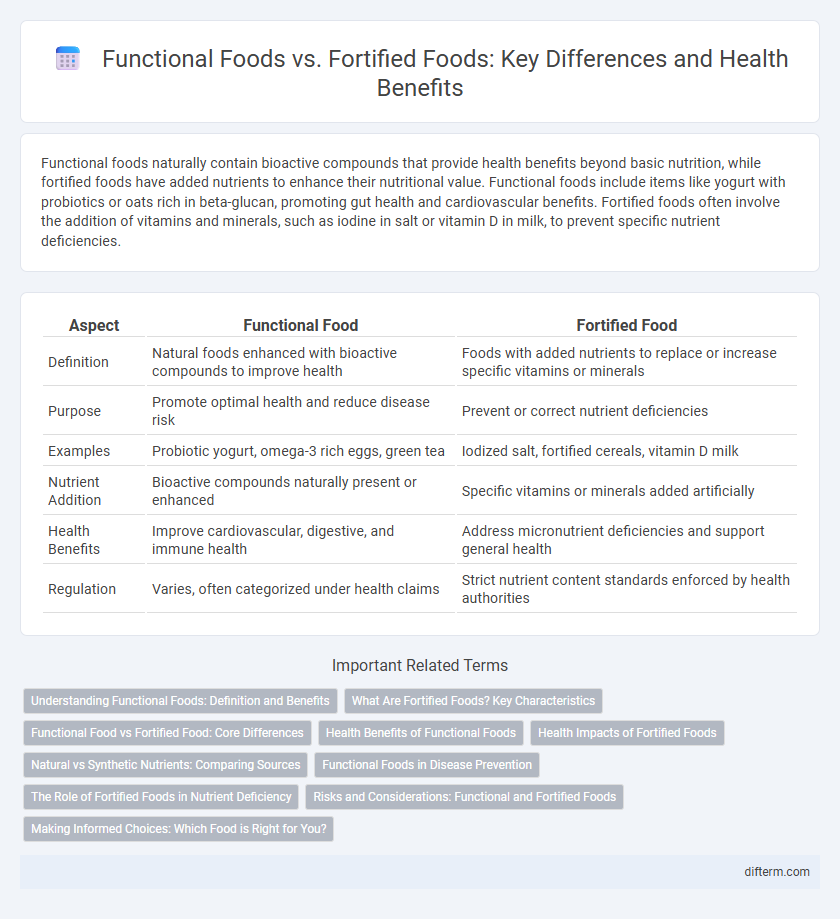Functional foods naturally contain bioactive compounds that provide health benefits beyond basic nutrition, while fortified foods have added nutrients to enhance their nutritional value. Functional foods include items like yogurt with probiotics or oats rich in beta-glucan, promoting gut health and cardiovascular benefits. Fortified foods often involve the addition of vitamins and minerals, such as iodine in salt or vitamin D in milk, to prevent specific nutrient deficiencies.
Table of Comparison
| Aspect | Functional Food | Fortified Food |
|---|---|---|
| Definition | Natural foods enhanced with bioactive compounds to improve health | Foods with added nutrients to replace or increase specific vitamins or minerals |
| Purpose | Promote optimal health and reduce disease risk | Prevent or correct nutrient deficiencies |
| Examples | Probiotic yogurt, omega-3 rich eggs, green tea | Iodized salt, fortified cereals, vitamin D milk |
| Nutrient Addition | Bioactive compounds naturally present or enhanced | Specific vitamins or minerals added artificially |
| Health Benefits | Improve cardiovascular, digestive, and immune health | Address micronutrient deficiencies and support general health |
| Regulation | Varies, often categorized under health claims | Strict nutrient content standards enforced by health authorities |
Understanding Functional Foods: Definition and Benefits
Functional foods are natural or processed foods that provide health benefits beyond basic nutrition by containing biologically active compounds that promote optimal health and reduce disease risk. Unlike fortified foods, which have added nutrients to prevent deficiencies, functional foods inherently support bodily functions such as improved digestion, enhanced immune response, and cardiovascular health. Examples include probiotics in yogurt, omega-3 fatty acids in flaxseeds, and antioxidants in berries, which contribute to overall wellness and chronic disease prevention.
What Are Fortified Foods? Key Characteristics
Fortified foods are products enhanced by adding essential vitamins and minerals absent or insufficient in their natural state, such as calcium-fortified orange juice or iodine-enriched salt. These foods aim to prevent or correct specific nutritional deficiencies in populations, supporting overall health and well-being. Key characteristics include deliberate nutrient enrichment, regulatory approval for safety and efficacy, and clear labeling to inform consumer choices.
Functional Food vs Fortified Food: Core Differences
Functional food naturally contains bioactive compounds that promote health beyond basic nutrition, such as probiotics in yogurt or omega-3 fatty acids in salmon. Fortified food, on the other hand, has essential nutrients added during processing to prevent deficiencies, like vitamin D in milk or iron in cereals. The core difference lies in functional food's inherent health benefits versus fortified food's nutrient enhancement for specific dietary needs.
Health Benefits of Functional Foods
Functional foods contain bioactive compounds that provide specific health benefits beyond basic nutrition, such as improving heart health, boosting immunity, and reducing inflammation. They naturally enhance physiological functions through ingredients like probiotics, antioxidants, and omega-3 fatty acids. Fortified foods, on the other hand, are enriched with added vitamins or minerals to address nutritional deficiencies but lack the inherent health-promoting bioactive compounds found in functional foods.
Health Impacts of Fortified Foods
Fortified foods, enriched with essential vitamins and minerals such as iron, vitamin D, and folic acid, play a crucial role in preventing nutrient deficiencies and associated health disorders like anemia and rickets. Regular consumption of fortified products supports immune function, cognitive development, and overall well-being by addressing specific dietary gaps prevalent in various populations. Evidence from public health studies links fortified food programs to reduced incidence of birth defects, improved bone health, and enhanced energy metabolism.
Natural vs Synthetic Nutrients: Comparing Sources
Functional foods contain natural nutrients derived directly from whole ingredients, offering bioactive compounds like antioxidants and fiber that support health. Fortified foods are enhanced with synthetic or isolated vitamins and minerals, such as vitamin D added to milk or folic acid in cereals, to address specific nutritional deficiencies. Natural nutrients in functional foods often have higher bioavailability and synergistic effects compared to the isolated synthetic nutrients found in fortified products.
Functional Foods in Disease Prevention
Functional foods, enriched with bioactive compounds such as antioxidants, probiotics, and omega-3 fatty acids, play a crucial role in disease prevention by enhancing immune function and reducing inflammation. Unlike fortified foods that merely add essential nutrients to prevent deficiencies, functional foods provide health benefits beyond basic nutrition, targeting chronic conditions like cardiovascular disease, diabetes, and cancer. Regular consumption of functional foods, including berries, fatty fish, and fermented products, supports overall well-being by modulating physiological processes and promoting gut health.
The Role of Fortified Foods in Nutrient Deficiency
Fortified foods play a crucial role in combating nutrient deficiencies by adding essential vitamins and minerals that are otherwise lacking in the diet. Examples include fortified cereals with iron and folic acid to prevent anemia and neural tube defects. This targeted enhancement helps improve public health outcomes, especially in vulnerable populations with limited access to diverse nutrition sources.
Risks and Considerations: Functional and Fortified Foods
Functional foods contain bioactive compounds that may offer health benefits, but excessive consumption can lead to nutrient imbalances or adverse effects, especially in individuals with pre-existing conditions. Fortified foods are engineered to address specific nutrient deficiencies, yet over-fortification risks include toxicity and interactions with medications. Careful evaluation of personal health status and consultation with healthcare professionals are essential to safely incorporate these foods into the diet.
Making Informed Choices: Which Food is Right for You?
Functional foods contain naturally occurring bioactive compounds that provide health benefits beyond basic nutrition, such as probiotics in yogurt or omega-3 in fatty fish. Fortified foods are products enhanced with added vitamins or minerals, like calcium-fortified orange juice or iodine-fortified salt, designed to address specific nutritional deficiencies. Making informed choices involves assessing individual dietary needs, health goals, and potential nutrient gaps to select the most appropriate option for improving overall well-being.
Functional food vs Fortified food Infographic

 difterm.com
difterm.com